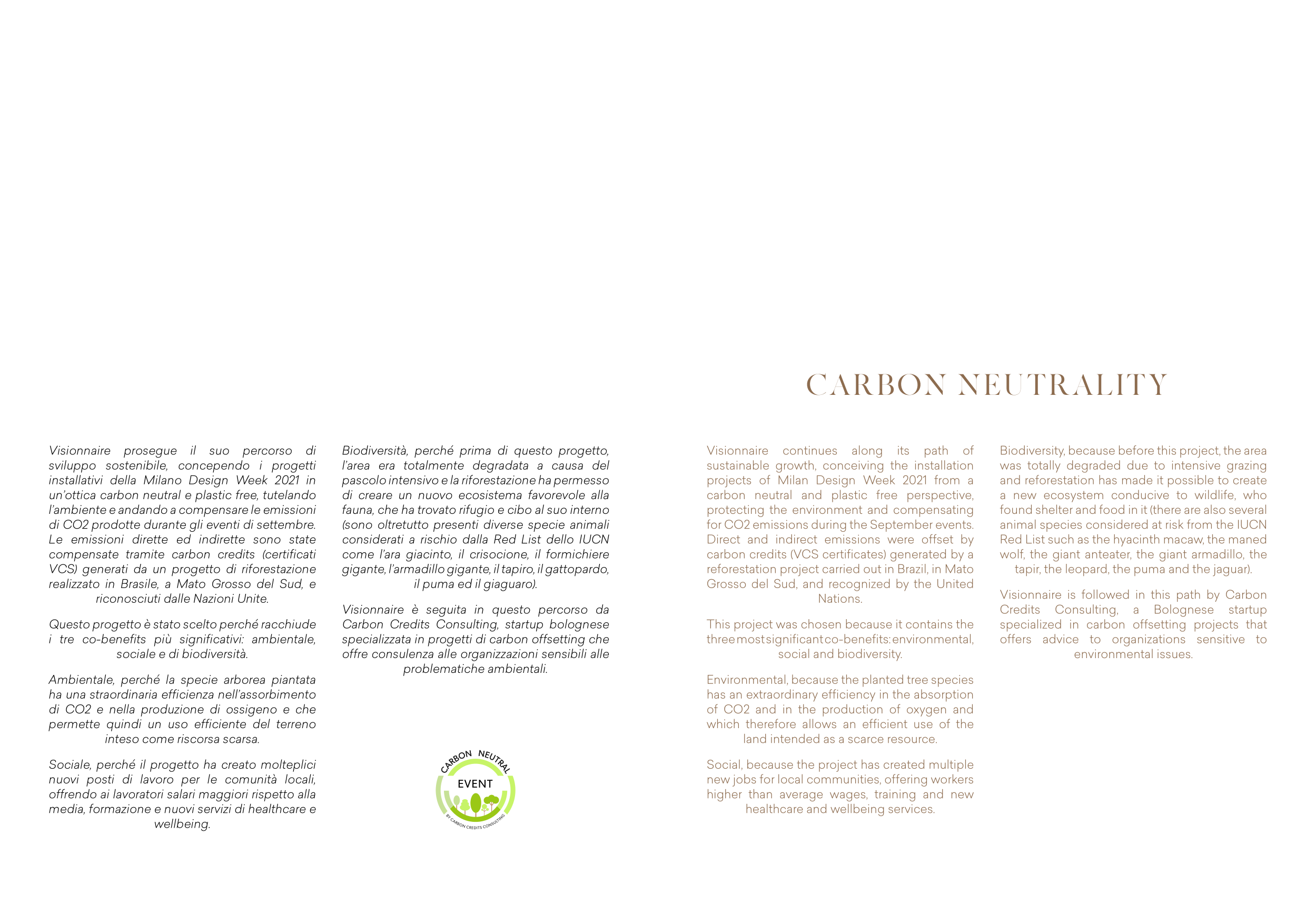Visionnaire
prosegue
il
suo
percorso
di
sviluppo sostenibile, concependo i progetti
installativi della Milano Design Week 2021 in
un’ottica carbon neutral e plastic free, tutelando
l’ambiente e andando a compensare le emissioni
di CO2 prodotte durante gli eventi di settembre.
Le emissioni dirette ed indirette sono state
compensate tramite carbon credits (certificati
VCS) generati da un progetto di riforestazione
realizzato in Brasile, a Mato Grosso del Sud, e
riconosciuti dalle Nazioni Unite.
Questo progetto è stato scelto perché racchiude
i tre co-benefits più significativi: ambientale,
sociale e di biodiversità.
Ambientale, perché la specie arborea piantata
ha una straordinaria efficienza nell’assorbimento
di CO2 e nella produzione di ossigeno e che
permette quindi un uso efficiente del terreno
inteso come riscorsa scarsa.
Sociale, perché il progetto ha creato molteplici
nuovi posti di lavoro per le comunità locali,
offrendo ai lavoratori salari maggiori rispetto alla
media, formazione e nuovi servizi di healthcare e
wellbeing.
Biodiversità, perché prima di questo progetto,
l’area era totalmente degradata a causa del
pascolo intensivo e la riforestazione ha permesso
di creare un nuovo ecosistema favorevole alla
fauna, che ha trovato rifugio e cibo al suo interno
(sono oltretutto presenti diverse specie animali
considerati a rischio dalla Red List dello IUCN
come l’ara giacinto, il crisocione, il formichiere
gigante, l’armadillo gigante, il tapiro, il gattopardo,
il puma ed il giaguaro).
Visionnaire è seguita in questo percorso da
Carbon Credits Consulting, startup bolognese
specializzata in progetti di carbon offsetting che
offre consulenza alle organizzazioni sensibili alle
problematiche ambientali.
CARBON NEUTRALITY
Visionnaire
continues
along
its
path
of
sustainable growth, conceiving the installation
projects of Milan Design Week 2021 from a
carbon neutral and plastic free perspective,
protecting the environment and compensating
for CO2 emissions during the September events.
Direct and indirect emissions were offset by
carbon credits (VCS certificates) generated by a
reforestation project carried out in Brazil, in Mato
Grosso del Sud, and recognized by the United
Nations.
This project was chosen because it contains the
three most significant co-benefits: environmental,
social and biodiversity.
Environmental, because the planted tree species
has an extraordinary efficiency in the absorption
of CO2 and in the production of oxygen and
which therefore allows an efficient use of the
land intended as a scarce resource.
Social, because the project has created multiple
new jobs for local communities, offering workers
higher than average wages, training and new
healthcare and wellbeing services.
Biodiversity, because before this project, the area
was totally degraded due to intensive grazing
and reforestation has made it possible to create
a new ecosystem conducive to wildlife, who
found shelter and food in it (there are also several
animal species considered at risk from the IUCN
Red List such as the hyacinth macaw, the maned
wolf, the giant anteater, the giant armadillo, the
tapir, the leopard, the puma and the jaguar).
Visionnaire is followed in this path by Carbon
Credits
Consulting,
a
Bolognese
startup
specialized in carbon offsetting projects that
offers advice to organizations sensitive to
environmental issues.


